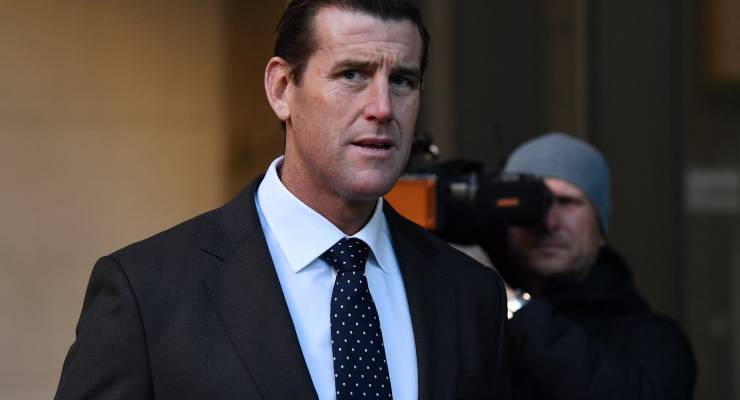
Ben Roberts-Smith asked an employee of Australia Post to analyse an anonymous letter accusing him of domestic violence so that he could ascertain if it had come from his former mistress, the Federal Court in Sydney heard this morning.
The former soldier told the court that in December 2017 he had received an anonymous letter saying that he had been seen in a particular hotel room with a woman who was not his wife — adding that he should go back to his wife, he said. This letter contained details which he had never revealed to another person.
Roberts-Smith also asked the Australia Post employee, Danielle Scott, who was his wife’s friend, to buy some “burner” phones so he could communicate with people without having his conversations intercepted by the media, he said.
He had done this because he was mindful of the News of the World phone-tapping scandal — not because he was trying to evade the attention of law enforcement agencies.
After an article accusing him of striking a woman appeared in the media in August 2018, he said to Scott: “We have that letter. Is there any way that we can have that letter analysed so it could be linked back to [the former lover]?”
Roberts-Smith’s legal team appears to be channelling the proverb of hell having no fury like a woman scorned to explain the fallout of this extramarital relationship.
Roberts-Smith’s former lover cannot be identified and is being referred to during proceedings as “Person 17”.
Yesterday afternoon Roberts-Smith’s was answering questions about the woman with whom he had had a tumultuous six-month affair and who alleged that Roberts-Smith hit her in the face with his arm.
Roberts-Smith is taking defamation action against three newspapers, The Sydney Morning Herald, The Age and The Canberra Times, plus three journalists, over accusations he committed war crimes, including murder, during his service in Afghanistan and that he committed an act of domestic violence. He denies all allegations.
When asked by his barrister, Bruce McClintock SC, if he had hit the woman, he replied: “Absolutely not. That particular allegation, I feel, coupled with being called a war criminal, has ruined my life. For a long time I found it very difficult to leave the house after that.”
He said domestic violence was “morally reprehensible” and he had no tolerance for anybody who would raise a hand to a woman.
Over three hours, McClintock took his client through the chronology of the relationship, which began in October 2017.
Roberts-Smith said that on Boxing Day 2017 he had received a “bizarre” phone call from the woman’s husband, who told him he was aware of the relationship and “said he thought she would be better with me and the children would be better off with me”.
The former soldier said he told the woman in January that he wanted to end the relationship. A month later, while she was in London with her husband, she sent him a message saying that “the world would be better off without her — letting me know that she was potentially going to self-harm”.
Roberts-Smith rang her several times with no response. A couple of days later, she contacted him to say she was unharmed but “hurt” by his rejection.
Some time later she insisted on speaking to Roberts-Smith face to face and told him she was pregnant. After many conversations, they agreed she would have a termination because “I had a family and she had a family”, he said.
He arranged for her to have the procedure in Brisbane so that he could support her, but when she asked him not to accompany her to the clinic he became suspicious that she wasn’t in fact pregnant. “I felt manipulated and didn’t think it was real,” he said.
He asked a private investigator to film her visit to the clinic. The private investigator sent a video of her leaving the clinic to Roberts-Smith, who considered it to be strong evidence that she had not had a procedure that day. She looked unaffected and had handled her luggage without impairment, unlike a woman who had had an invasive procedure.
When the woman went to meet Roberts-Smith he showed her the footage and she began to cry. She said she had had the procedure in Townsville and then broke down and said she’d had a miscarriage. Roberts-Smith said he believed he was being “manipulated so I would stay in the relationship”. However, the relationship between the pair continued, he said.
In May that year she accompanied him to a formal dinner at Parliament House in Canberra. Because he had been attending in an official capacity, they had been sitting at different tables and when he went over to tell her that he would like to leave, he realised that she was affected by alcohol, he said.
He told her there was a car coming to collect them and that he would meet her outside. After he went outside she failed to turn up and after waiting for 10 minutes he went back inside. She told him she was coming and so he went back outside to wait for her on the forecourt of Parliament House.
After some time, two AFP officers approached him to say that a woman had fallen down the stairs and had hit her head, he said. He came back to find Person 17 with a large bump on her head.
“She was extremely intoxicated. She was not coherent and just said her head hurt,” he said.
After checking to see if she wanted to go to hospital, he took her back to the hotel and put her to bed, placing a bag of ice on the bump on her head. He lay next to her and took her vital signs during the night as he was concerned about the effect of a head injury, he said.
Person 17 claims that she acquired the bump on her head after Roberts-Smith hit her during an argument. When she went to the airport the next morning to return home, the pair exchanged text messages about what she was going to tell her husband, who hadn’t known she was in Canberra with the former soldier.
In one of the messages, he said: “Does he think I did it?”
This incident was “highly embarrassing. It effectively was the final straw for our relationship. I found her behaviour to be really disrespectful and inappropriate,” Roberts-Smith told the court.
Asked about this, Roberts-Smith said that if the husband saw a “woman walking around with a big bruise on her head — I assumed he would think I had something to do with it”.
McClintock: “Did you hit her?”
Roberts-Smith: “Absolutely not.”
Later Roberts-Smith met Person 17 at a Brisbane airport hotel to end the relationship. They spent the night, and the next day he flew to Canberra and assumed that she would return to her home in regional Queensland. However, his wife contacted him to say that the woman had turned up at their home.
This behaviour had been the final straw and he had had no further contact with the woman, Roberts-Smith said.
The hearing continues.








Crikey encourages robust conversations on our website. However, we’re a small team, so sometimes we have to reluctantly turn comments off due to legal risk. Thanks for your understanding and in the meantime, have a read of our moderation guidelines.